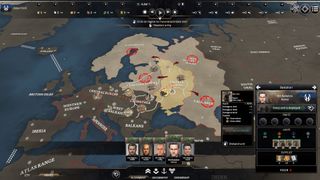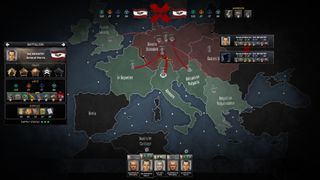This mashup of city builder and grand strategy will take you from building a capital city to achieving 'total global domination'
In Kaiserpunk, you don't just manage a city, you span the globe.

City builders keep on getting bigger, not just by stretching into other genres like survival, puzzle, and strategy, but by expanding into broader game systems than just city planning, building, and management. Frostpunk's expeditions take you away from the city to explore the map for resources and narrative events, Cities: Skylines 2 lets you trade materials, products, and even water and electricity with other regions, and in The Wandering Village, your entire city literally walks across the world ('cuz it's built on a dinosaur's back).
That kind of expansion beyond straightforward city management is great, but it's clearly not quite enough for Overseer Games. The studio's next game, Kaiserpunk, isn't just a city builder but a grand strategy game, and it will take you from building and managing a city all the way to "total global domination through tactics-ridden warfare and logistics mechanics spanning the entire globe."
That's pretty ambitious. Last month the developers outlined the city building portion of the Kaiserpunk in a diary on Steam, and today they're lifting the curtain on the grand strategy aspects of the game—beginning with managing players' expectations.
"If you're expecting Hearts of Iron... don't. This isn't it," the developer wrote on Steam. "We're mixing genres, not literally making two full massive games as one." Another game Kaiserpunk isn't: Total War. "You won't be arranging royal marriages or passing on your rule to your descendants," the dev said.
Which doesn't mean the grand strategy systems aren't pretty intricate. In the alt-history of Kaiserpunk, World War 1 and World War 2 have kinda merged into one big long conflict the entire planet is embroiled in. A lot comes into play while you're on the global map as you move your military forces around: your army's composition, the terrain type of the region you're in, the experience of each army unit and the supply lines supporting it—even the direction you're attacking from all have to be carefully considered at every step.
"You'll also be able to construct region upgrades to boost some aspects like resource yield, immigration, region defenses, infrastructure to help your armies move through the region faster," the developer says.
How does your city fit into all this? Well, supplies are extremely important for your military, so you'll need to keep your city efficiently producing the resources you need, and then distribute them through supply chains. Keeping those chains intact will be key—armies won't just consist of land and air units but a navy, and you'll need to contend with naval blockades on top of everything else.
The biggest gaming news, reviews and hardware deals
Keep up to date with the most important stories and the best deals, as picked by the PC Gamer team.

I know that sounds like a lot of all-out war, but diplomatic tools are at your disposal too. "Diplomacy is always an option," says Overseer Games. "Seeing as Kaiserpunk is all about (well, not all, but a lot about) production, you conduct diplomacy also through or facilitated by production. Simple trading with another faction will increase your economic relationship, your economic bond. The more you trade (both ways), the better the relationship." You can even merge nations together if your economic bond grows strong enough.
It sounds like a lot to handle—don't forget, you're also building and managing a city while this massive global conflict is happening—but on the plus side, switching between your city and the rest of the world will be a snap, and completely loading screen-free. "There's no loading, no hiccups, no weird 'wait right there until I load up some stuff first,'" Overseer Games says. "Your capital and the entire global map work under the same rules and in the same timeline. If time passes in your capital, it does the same in the world."
You can read the full Kaiserpunk dev diary here on Steam.

Chris started playing PC games in the 1980s, started writing about them in the early 2000s, and (finally) started getting paid to write about them in the late 2000s. Following a few years as a regular freelancer, PC Gamer hired him in 2014, probably so he'd stop emailing them asking for more work. Chris has a love-hate relationship with survival games and an unhealthy fascination with the inner lives of NPCs. He's also a fan of offbeat simulation games, mods, and ignoring storylines in RPGs so he can make up his own.
Most Popular






